
If you're reading more, here are some new works by College faculty and alumni to add to your list.
 Lucean Arthur Headen: The Making of a Black Inventor and Entrepreneur (UNC Press, February 2020) by Jill D. Snider (B.A. English ’82, M.A. history ’86, Ph.D. history ’95). Snider explores the life and legacy of Carthage, North Carolina, native Lucean Arthur Headen, an inspiring black artisan and entrepreneur. Headen eventually earned 11 patents, most for innovative engine designs and anti-icing methods for aircraft, and he founded the first national black auto racing association in 1924.
Lucean Arthur Headen: The Making of a Black Inventor and Entrepreneur (UNC Press, February 2020) by Jill D. Snider (B.A. English ’82, M.A. history ’86, Ph.D. history ’95). Snider explores the life and legacy of Carthage, North Carolina, native Lucean Arthur Headen, an inspiring black artisan and entrepreneur. Headen eventually earned 11 patents, most for innovative engine designs and anti-icing methods for aircraft, and he founded the first national black auto racing association in 1924.
Aristotle: A Quick Immersion (Tibidado Publishing Inc., September 2019) by C.D.C. Reeve, Delta Kappa Epsilon Distinguished Professor of Philosophy. Reeve’s new book offers insights into how to read Aristotle in a holistic way, showing the reader what it’s like to see the universe and our place in it as he thought they should be seen. One reviewer wrote: “C.D.C. Reeve is one of the world’s most accomplished scholars of Aristotle’s thought” while another added “this quick immersion … is breathtaking and an eye-opener.”
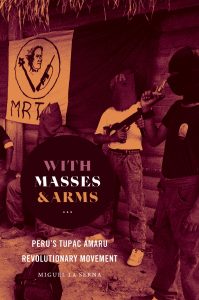 With Masses and Arms: Peru’s Tupac Amaru Revolutionary Movement (UNC Press, June 2020) by Miguel La Serna, associate professor of Latin American history. La Serna examines the history of the Tupac Amaru Revolutionary Movement (MRTA) to provide insight into the history of modern Peru and the link between political violence and the culture of communications in Latin America.
With Masses and Arms: Peru’s Tupac Amaru Revolutionary Movement (UNC Press, June 2020) by Miguel La Serna, associate professor of Latin American history. La Serna examines the history of the Tupac Amaru Revolutionary Movement (MRTA) to provide insight into the history of modern Peru and the link between political violence and the culture of communications in Latin America.
Urban Cadence: Street Scenes from Lagos and Johannesburg (Gund Gallery, Kenyon College, 2019) by Carol Magee, associate professor of art history. This galley catalogue tells the multifaceted stories of two urban environments — Lagos, Nigeria, and Johannesburg, South Africa — as experienced through the artistic representations of photography and video. It includes interviews with the artists.
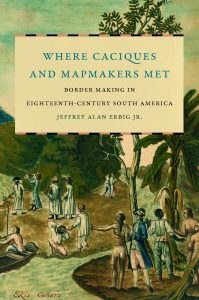 Where Caciques and Mapmakers Met: Border Making in Eighteenth-Century South America (UNC Press, April 2020) by Jeffrey Alan Erbig Jr. (M.A. ’10, Ph.D. ’15, Latin American history). Drawing upon manuscripts from over two dozen archives in seven countries, Erbig considers what the efforts of commissioned mapmakers meant to Indigenous peoples whose lands the border crossed. It reveals that Native agents shaped when and where the border was drawn and fused it to their own territorial claims.
Where Caciques and Mapmakers Met: Border Making in Eighteenth-Century South America (UNC Press, April 2020) by Jeffrey Alan Erbig Jr. (M.A. ’10, Ph.D. ’15, Latin American history). Drawing upon manuscripts from over two dozen archives in seven countries, Erbig considers what the efforts of commissioned mapmakers meant to Indigenous peoples whose lands the border crossed. It reveals that Native agents shaped when and where the border was drawn and fused it to their own territorial claims.
Troublemakers: Chicago Freedom Struggles through the Lens of Art Shay (University of Chicago Press, January 2020) by Erik S. Gellman, associate professor of history. Gellman examines the work of freelance photographer Art Shay in this new book. Troublemakers fuses photography and history to demonstrate how racial and economic inequality gave rise to a decades-long struggle for justice in Chicago. Shay’s lens captured everything from private moments to era-defining public movements as he sought to understand freedom struggles in the Windy City.
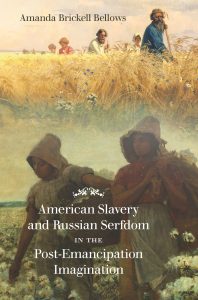 American Slavery and Russian Serfdom in the Post-Emancipation Imagination (UNC Press, June 2020) by Amanda Brickell Bellows (M.A. ’12, Ph.D. ’16, history). Analyzing portrayals of African Americans and Russian serfs in oil paintings, advertisements, fiction, poetry and ephemera housed in American and Russian archives, Bellows argues that these widely circulated depictions shaped the collective memory of slavery and serfdom, affected the development of national consciousness and influenced public opinion as peasants and freed people strove to exercise their newfound rights after the abolition of Russian serfdom in 1861 and American slavery in 1865.
American Slavery and Russian Serfdom in the Post-Emancipation Imagination (UNC Press, June 2020) by Amanda Brickell Bellows (M.A. ’12, Ph.D. ’16, history). Analyzing portrayals of African Americans and Russian serfs in oil paintings, advertisements, fiction, poetry and ephemera housed in American and Russian archives, Bellows argues that these widely circulated depictions shaped the collective memory of slavery and serfdom, affected the development of national consciousness and influenced public opinion as peasants and freed people strove to exercise their newfound rights after the abolition of Russian serfdom in 1861 and American slavery in 1865.
 Brazil’s Revolution in Commerce: Creating Consumer Capitalism in the American Century (UNC Press, May 2020) by James P. Woodard (B.A. ’97, history). Woodward analyzes the history of consumer capitalism in Brazil during the 20th century, a time when the United States became Brazil’s most important trading partner, to highlight the commercial and cultural shift that occurred in the nation.
Brazil’s Revolution in Commerce: Creating Consumer Capitalism in the American Century (UNC Press, May 2020) by James P. Woodard (B.A. ’97, history). Woodward analyzes the history of consumer capitalism in Brazil during the 20th century, a time when the United States became Brazil’s most important trading partner, to highlight the commercial and cultural shift that occurred in the nation.
Public Negotiations: Gender and Journalism in Contemporary US Latina/o Literature (Ohio State University Press, October 2019) by Ariana E. Vigil, associate professor of women’s and gender studies. Vigil examines how the boundaries of the Latina/o public sphere are negotiated through mass media. Focusing on a wide range of 20th – and 21st-century Latina/o literary texts that feature Latina/o media figures — works by Lucha Corpi, Oscar Zeta Acosta, Cherríe Moraga and Rubén Salazar, among others — Vigil examines the relationship between Latina/o media and Latina/o publics and reflects on how literature demonstrates a sustained interest in this relationship.
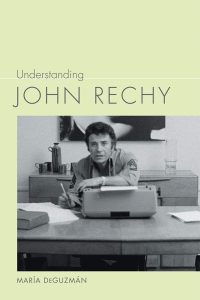 Understanding John Rechy (University of South Carolina Press, August 2019) by Maria DeGuzman, professor of English and comparative literature and founding director of the UNC Latina/o Studies Program. In this first book-length monograph on the Mexican American novelist, essayist, and playwright John Rechy, DeGuzman offers an analysis of the spectrum of his writing. DeGuzman presents a brief biographical overview of Rechy, traces the development of Rechy’s craft through his major works and examines the complexities of Rechy’s representation of identity.
Understanding John Rechy (University of South Carolina Press, August 2019) by Maria DeGuzman, professor of English and comparative literature and founding director of the UNC Latina/o Studies Program. In this first book-length monograph on the Mexican American novelist, essayist, and playwright John Rechy, DeGuzman offers an analysis of the spectrum of his writing. DeGuzman presents a brief biographical overview of Rechy, traces the development of Rechy’s craft through his major works and examines the complexities of Rechy’s representation of identity.
Contagion and the Shakespearean Stage (Palgrave Macmillan, June 2019), edited by Mary Floyd-Wilson, Bowman and Gordon Gray Distinguished Term Professor and chair of English and comparative literature, and David Chalk. In a wide range of essays focused on early modern drama and the culture of theater, contributors explore how ideas of contagion not only inform representations of the senses and emotions, but also shape how people understood belief, narrative and political agency.
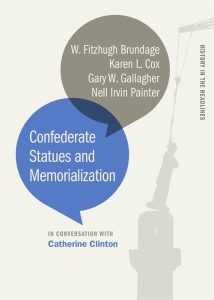 Confederate Statues and Memorialization (University of Georgia Press, April 2019) by W. Fitzhugh Brundage, William B. Umstead Distinguished Professor of History, and Catherine Clinton, Karen L. Cox, Gary W. Gallagher and Nell Irvin Painter. Nine killed in Charleston church shooting. White supremacists demonstrate in Charlottesville. Monuments decommissioned in New Orleans and Chapel Hill. The headlines keep coming, and the debate rolls on. How should we contend with our troubled history as a nation? What is the best way forward? Confederate Statues and Memorialization offers a rich discussion between four leading scholars who have studied the history of Confederate memory and memorialization.
Confederate Statues and Memorialization (University of Georgia Press, April 2019) by W. Fitzhugh Brundage, William B. Umstead Distinguished Professor of History, and Catherine Clinton, Karen L. Cox, Gary W. Gallagher and Nell Irvin Painter. Nine killed in Charleston church shooting. White supremacists demonstrate in Charlottesville. Monuments decommissioned in New Orleans and Chapel Hill. The headlines keep coming, and the debate rolls on. How should we contend with our troubled history as a nation? What is the best way forward? Confederate Statues and Memorialization offers a rich discussion between four leading scholars who have studied the history of Confederate memory and memorialization.
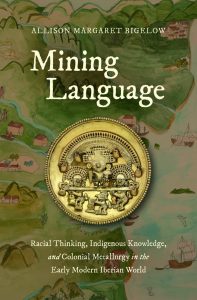 Mining Language: Racial Thinking, Indigenous Knowledge, and Colonial Metallurgy in the Early Modern Iberian World (UNC Press, May 2020) by Allison Margaret Bigelow (M.A. ’07, Ph.D. ’12, English). Mining Language is the first book-length study of the technical and scientific vocabularies that miners developed in the 16th and 17th centuries as they engaged with metallic materials. Bigelow documents the intellectual contributions indigenous and African miners made to the engine of European colonialism.
Mining Language: Racial Thinking, Indigenous Knowledge, and Colonial Metallurgy in the Early Modern Iberian World (UNC Press, May 2020) by Allison Margaret Bigelow (M.A. ’07, Ph.D. ’12, English). Mining Language is the first book-length study of the technical and scientific vocabularies that miners developed in the 16th and 17th centuries as they engaged with metallic materials. Bigelow documents the intellectual contributions indigenous and African miners made to the engine of European colonialism.
Between Rhyme and Reason: Vladimir Nabokov, Translation and Dialogue (University of Toronto Press, May 2019) by Stanislav Shvabrin, associate professor of Russian in the department of Germanic and Slavic languages and literatures. In Between Rhyme and Reason, Shvabrin discloses the complexity, nuance and contradictions behind one of the most controversial literary translators and translation theorists of modern time, Vladimir Nabokov.
 Coaching for the Love of the Game: A Practical Guide for Working with Young Athletes (UNC Press, March 2020) by Jennifer L. Etnier (M.A. ’90, sport psychology). Etnier gives easy-to-understand guidance on important aspects of successful coaching — including information on the development of children’s motor skills, communication with a young athlete’s parents and nurturing a growth-oriented mindset — making this a critical resource for youth coaches of all experience levels.
Coaching for the Love of the Game: A Practical Guide for Working with Young Athletes (UNC Press, March 2020) by Jennifer L. Etnier (M.A. ’90, sport psychology). Etnier gives easy-to-understand guidance on important aspects of successful coaching — including information on the development of children’s motor skills, communication with a young athlete’s parents and nurturing a growth-oriented mindset — making this a critical resource for youth coaches of all experience levels.
The Art of Emergency: Aesthetics and Aid in African Crises (Oxford University Press, January 2020) by Chérie Rivers Ndaliko, associate professor of music, and Samuel Mark Anderson. The Art of Emergency is the first comparative analysis of aesthetics and art production amidst humanitarian interventions throughout Africa. It explores the role of art in development projects and experiential conditions of crisis.
 All the Agents and Saints: Dispatches from the U.S. Borderlands (UNC Press, paperback edition, February 2020), by Stephanie Elizondo Griest, associate professor and Margaret R. Shuping Fellow of Creative Nonfiction in the department of English and comparative literature. In this paperback edition, Griest, a South Texas native, parallels the radical transformation of her homeland to her new home on the New York-Canada borderline. Griest weaves seven years of stories into a mediation on the impact of international borderlines by illuminating the spaces in between and the people who live there.
All the Agents and Saints: Dispatches from the U.S. Borderlands (UNC Press, paperback edition, February 2020), by Stephanie Elizondo Griest, associate professor and Margaret R. Shuping Fellow of Creative Nonfiction in the department of English and comparative literature. In this paperback edition, Griest, a South Texas native, parallels the radical transformation of her homeland to her new home on the New York-Canada borderline. Griest weaves seven years of stories into a mediation on the impact of international borderlines by illuminating the spaces in between and the people who live there.
The Damned (Penguin Random House, June 2020) by Renée Ahdieh (political science and English ’05). New York Times bestselling author Ahdieh returns with the second installment of her new romantic series. Following the events of The Beautiful, Sébastien Saint Germain is now cursed and forever changed. The treaty between the Fallen and the Brotherhood has been broken, and war between the immortals seems imminent. The price of loving Celine was costly. Just as Bastien and Celine begin to uncover the danger around them, they learn their love could tear them apart.
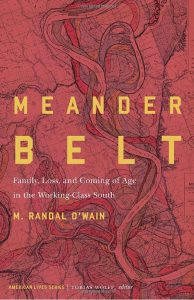 Meander Belt: Family, Loss and Coming of Age in the Working-Class South (University of Nebraska Press, October 2019) by M. Randal O’Wain, assistant teaching professor of creative writing in the department of English and comparative literature. In his memoir, O’Wain offers a reflection on how a working-class boy from Memphis, Tennessee, came to fall in love with language, reading, writing and the larger world outside of the American South. O’Wain assembles a subtle and spare portrait of his roots and family and ultimately discovers that his working-class upbringing is not so antithetical to the man he has become. Listen to a WUNC “The State of Things” interview about the book.
Meander Belt: Family, Loss and Coming of Age in the Working-Class South (University of Nebraska Press, October 2019) by M. Randal O’Wain, assistant teaching professor of creative writing in the department of English and comparative literature. In his memoir, O’Wain offers a reflection on how a working-class boy from Memphis, Tennessee, came to fall in love with language, reading, writing and the larger world outside of the American South. O’Wain assembles a subtle and spare portrait of his roots and family and ultimately discovers that his working-class upbringing is not so antithetical to the man he has become. Listen to a WUNC “The State of Things” interview about the book.
Silver Wings, Iron Cross: A World War II Thriller (Kensington, May 2020) by Tom Young (B.A., M.A. communication ’83, ’87). From air combat veteran Young comes the explosive saga of two enemy combatants — an American pilot and German U-boat officer — united by fate in an epic fight for survival. World War II Lieutenant Karl Hagan earned his wings the hard way. But when his plane is shot down behind enemy lines, he’s forced to make the hardest decision of his life: trusting the enemy.
Chinese for Working Professionals (Routledge Taylor & Francis Group, December 2019) by Yi Zhou, teaching professor in Chinese in the department of Asian studies, and Haidan Wang, associate professor of Chinese at the University of Hawaii at Manoa. Chinese for Working Professionals is for learners who intend to use Chinese in a multinational global workplace. Topical themes expose the ongoing changes in China for working professionals such as career preparation, economic development, business etiquette, the working environment and overall lifestyle. Read a story about Zhou and the book at Endeavors.
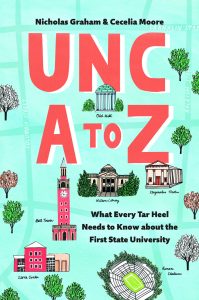 UNC A to Z: What Every Tar Heel Needs to Know about the First State University (UNC Press, April 2020) by Nicholas Graham, University archivist, and Cecelia Moore (Ph.D. history ’13), former University historian. Covering everything from the Old Well to the Speaker Ban and more, UNC A to Z is a concise, easy-to-read introduction to the nation’s first public university. Perfect for new students getting to know the campus or alumni who want to learn more about their alma mater, this richly illustrated reference contains more than 350 entries packed with fascinating facts, interesting stories and little-known histories of the people, places and events that have shaped the Carolina we know today.
UNC A to Z: What Every Tar Heel Needs to Know about the First State University (UNC Press, April 2020) by Nicholas Graham, University archivist, and Cecelia Moore (Ph.D. history ’13), former University historian. Covering everything from the Old Well to the Speaker Ban and more, UNC A to Z is a concise, easy-to-read introduction to the nation’s first public university. Perfect for new students getting to know the campus or alumni who want to learn more about their alma mater, this richly illustrated reference contains more than 350 entries packed with fascinating facts, interesting stories and little-known histories of the people, places and events that have shaped the Carolina we know today.
Managing the Environment, Managing Ourselves (third edition): A History of American Environmental Policy (Yale University Press, March 2020) by Richard N.L. “Pete” Andrews, professor emeritus of public policy. Andrews received a master of regional planning in 1970 and a Ph.D. in environmental policy and planning in 1972 from UNC. Andrews looks back at four centuries of American environmental policy, showing how these policies affect contemporary environmental issues and public policy decisions and identifying key policy challenges for the future. The book contains updates through the Obama and Trump administrations.
 Weather (Penguin Random House, February 2020) by Jenny Offill (English/creative writing ’90).
Weather (Penguin Random House, February 2020) by Jenny Offill (English/creative writing ’90).
Lizzie Benson slid into her job as a librarian without a traditional degree. But this gives her a vantage point from which to practice her other calling: she is a fake shrink. For years she has tended to her God-haunted mother and her recovering addict brother. Then her old mentor, Sylvia Liller, makes a proposal. She’s become famous for her prescient podcast, Hell and High Water, and wants to hire Lizzie to answer the mail she receives. Read a story in The New York Times Magazine about Offill’s new book.
Pluriversal Politics: The Real and the Possible (Duke University Press, April 2020) by Arturo Escobar, professor emeritus of anthropology. Escobar engages with the politics of the possible and how established notions of what is real and attainable preclude the emergence of radically alternative visions of the future. Read a feature story on Escobar in the College’s fall 2019 magazine.
Heaven and Hell: A History of the Afterlife (Simon and Schuster, March 2020) by Bart D. Ehrman, James A. Gray Distinguished Professor of Religious Studies. What happens when we die? A recent Pew Research poll showed that 72% of Americans believe in a literal heaven, 58% in a literal hell. Most people assume they are the age-old teachings of the Bible. But eternal rewards and punishments are found nowhere in the Old Testament and are not what Jesus or his disciples taught. In clear and compelling terms, Ehrman recounts the long history of the afterlife, ranging from The Epic of Gilgamesh up to the writings of Augustine, focusing especially on the teachings of Jesus and his early followers.
Visit college.unc.edu for “Bookmark This,” a monthly Q&A highlighting books by Carolina people.
Published in the Spring 2020 issue | Chapter & Verse
Read More
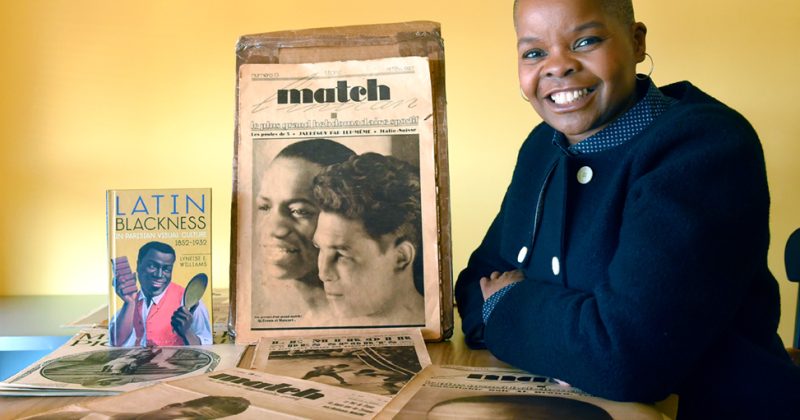
Preserving an accurate visual history
An art historian is leading efforts to inform decision-makers about…
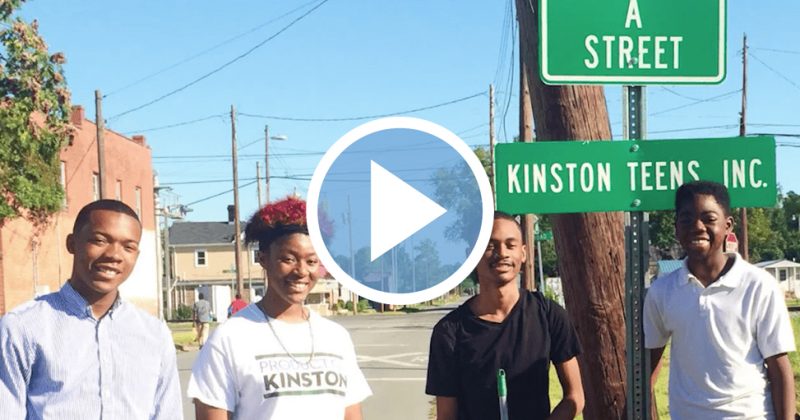
Meet a Tar Heel: Chris Suggs, Class of 2021
Service has been a hallmark of Chris Suggs’ teenage years…
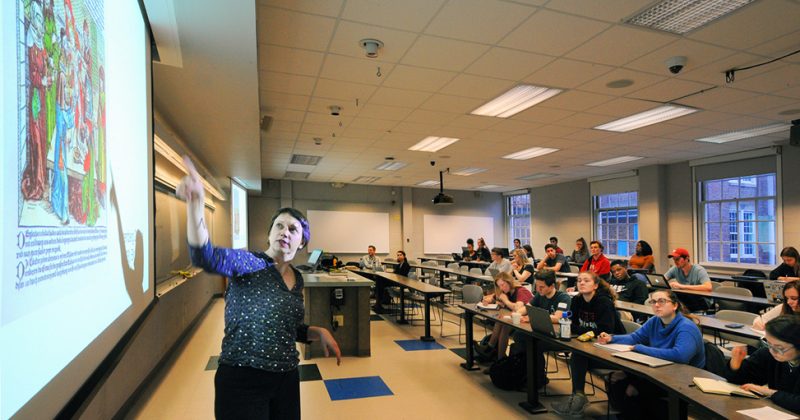
Confronting antisemitism
“Topics in Jewish Studies: Confronting Antisemitism” is a new, one-credit-hour…

